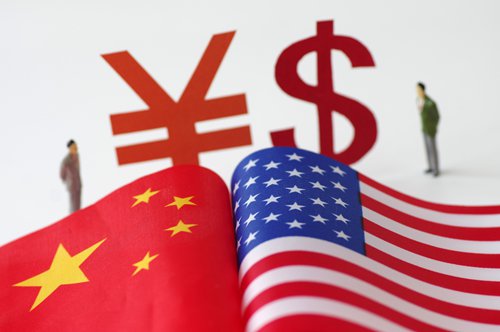HOME >> BUSINESS
Trade war could embroil financial sector
By Chen Qingqing Source:Global Times Published: 2019/6/5 20:38:40
Market-driven reforms, yuan internationalization can work against US dollar

Photo: VCG
Beijing should stay alert to the possibility of the US-China trade war escalating to engulf the financial sector and insist on market-driven financial reforms to enhance domestic money market stability, a prominent Chinese economist warned on Wednesday.
The US has been blaming China for its trade deficit, but Washington has long run a trade deficit as the Bretton Woods system, based on the US dollar, has triggered a global imbalance, Li Yang, director-general of government think-tank National Institution for Finance & Development, said during a conference held in Beijing on Wednesday.
"The US dollar, as the largest global reserve currency, co-exists with a deeper paradox," he said, noting that increasing supplies of the US dollar can only be achieved by running a current-account deficit.
"There were always financial factors behind US-initiated trade wars throughout history," Li told the Global Times during the conference. The economist also warned that China should accelerate financial reforms while keeping the yuan flexible to the market regulation, which could help maintain stable foreign reserves.
Amid a deteriorating trade war between the two largest economies, investors have been keeping a close eye on whether the yuan would breach the 7 yuan per US dollar exchange rate, which is considered a crucial point for the Chinese currency.
"It won't make any difference if we defend the level of 7 or not. As a floating currency, the yuan has a market-driven exchange rate mechanism, and the US can't find any fault with that," Li said.
The US Treasury recently declined to label China a currency manipulator in its semi-annual foreign exchange report, and the Chinese side considered this decision to be in line with common understanding, according to media reports in May.
"Currency flexibility will also help us to maintain stable foreign reserves. Meanwhile, China's financial sector needs to strengthen its ability to counter external pressure and our money supply should not be influenced by foreign reserves," the economist noted.
Some analysts suggested that China may use its holdings of US debt as a "nuclear option" for containing the US in a trade war.
"That option isn't on the table," Li said. As China cannot totally get rid of the US dollar, which is still the eminent reserve currency, a fire sale of US Treasury securities will only cause market turbulence.
In addition to financial reforms, China has been pursuing the internationalization of the yuan along with the Belt and Road Initiative, which are necessary measures to make the yuan more resilient amid escalating trade war between the two powers, the economist noted.
The year-long trade war may help promote the internationalization of the yuan as the Chinese currency seeks a global footprint, as some countries may shift from the US currency to the yuan in light of the erratic policies and rising protectionism of the Trump administration, according to analysts.
China's central bank announced Wednesday it would expand the RMB Qualified Foreign Institutional Investor pilot program to the Netherlands, a step to promote yuan globalization.
Posted in: ECONOMY,BIZ FOCUS